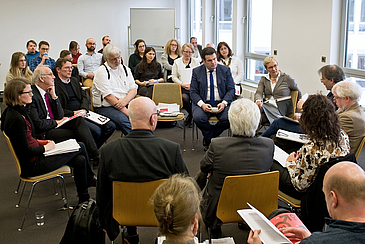The Federal Minister of Labor and Social Affairs, Hubertus Heil, visited the SOCIUM – Research Center on Inequality and Social Policy on February 8, 2019. Accompanied by the Senator of Science, Health and Consumer Protection, Eva Quante-Brandt, the Federal Minister discussed the state of social policy research, the possibilities of strengthened continuing education in the field of social policy, and his current legislative proposals – in particular the introduction of a basic pension – with SOCIUM scientists.
A Pleasurable Visit
Senator Eva Quante-Brandt was pleased “that Hubertus Heil came to SOCUM, one of Bremen’s outstanding research institutes, for the workshop discussion. Social sciences, in particular social policy and inequality research, are one of Bremen’s high-profile areas. Urgent questions of our time are asked here: How does inequality arise? And how can employment biographies be structured in such a way that retirement pensions are adequate? It’s about the social cohesion of our society.”
During the discussion, it became clear that low pensions and growing poverty among the elderly are a pressing problem that calls into question the legitimacy of the statutory pension insurance system as a whole. The Federal Minister explained that his ministry, together with the Fördernetzwerk interdisziplinäre Sozialpolitikforschung (funding network for interdisciplinary social policy research – FIS – www.fis-netzwerk.de), has taken an important first step towards promoting social policy research. Further projects are to follow.
“Dependent on Social Policy Research”
“As Minister of Labor and Social Affairs, I am dependent on social policy research beyond the time horizon of daily politics in order to recognize and solve problems at an early stage,” says Hubertus Heil. “Social policy research helps society in the debate about the future of the welfare state. I am therefore very pleased that SOCIUM is providing important impetus here and is involved in the FIS funding network for interdisciplinary social policy research.”
Dieter Wolf

